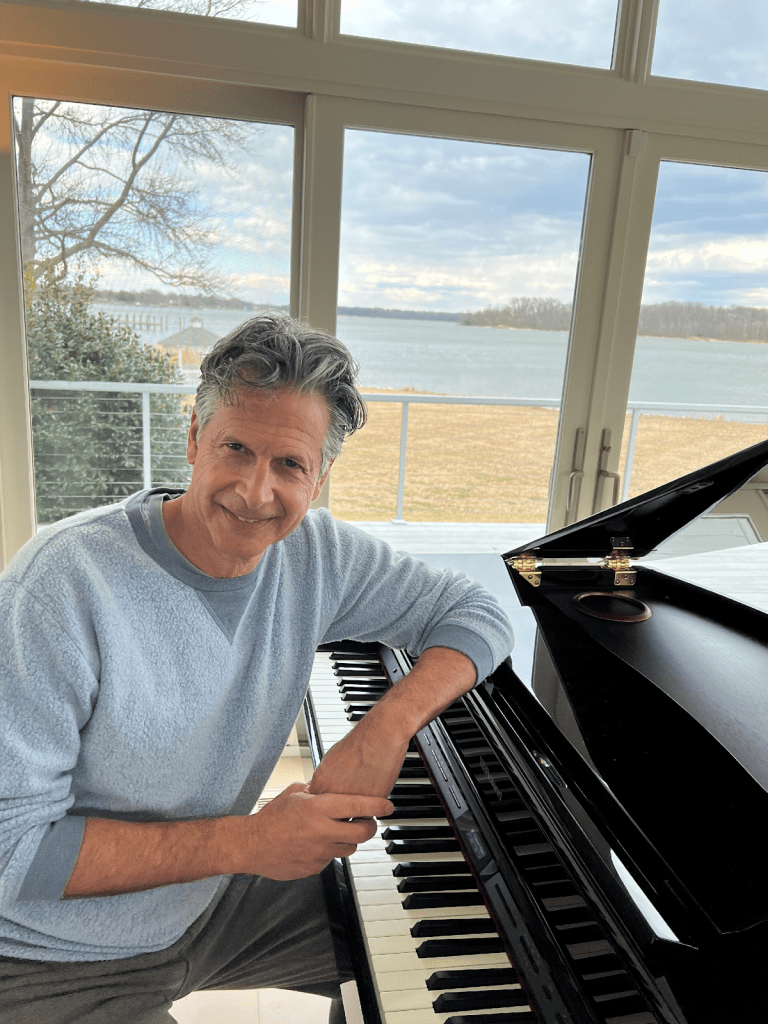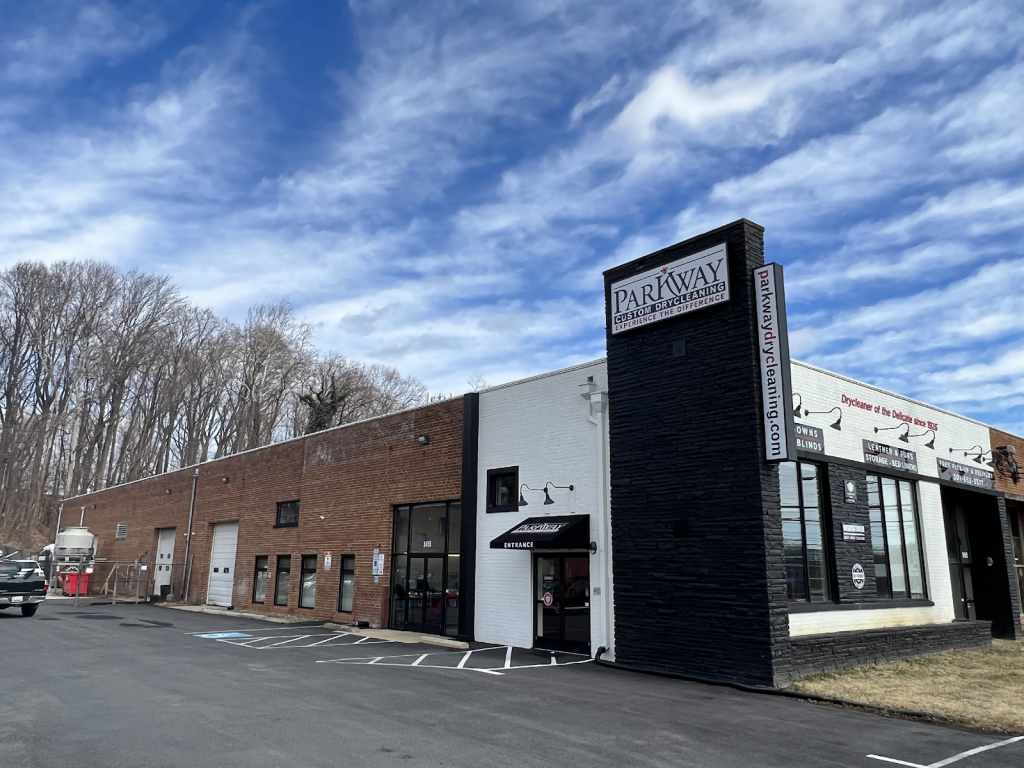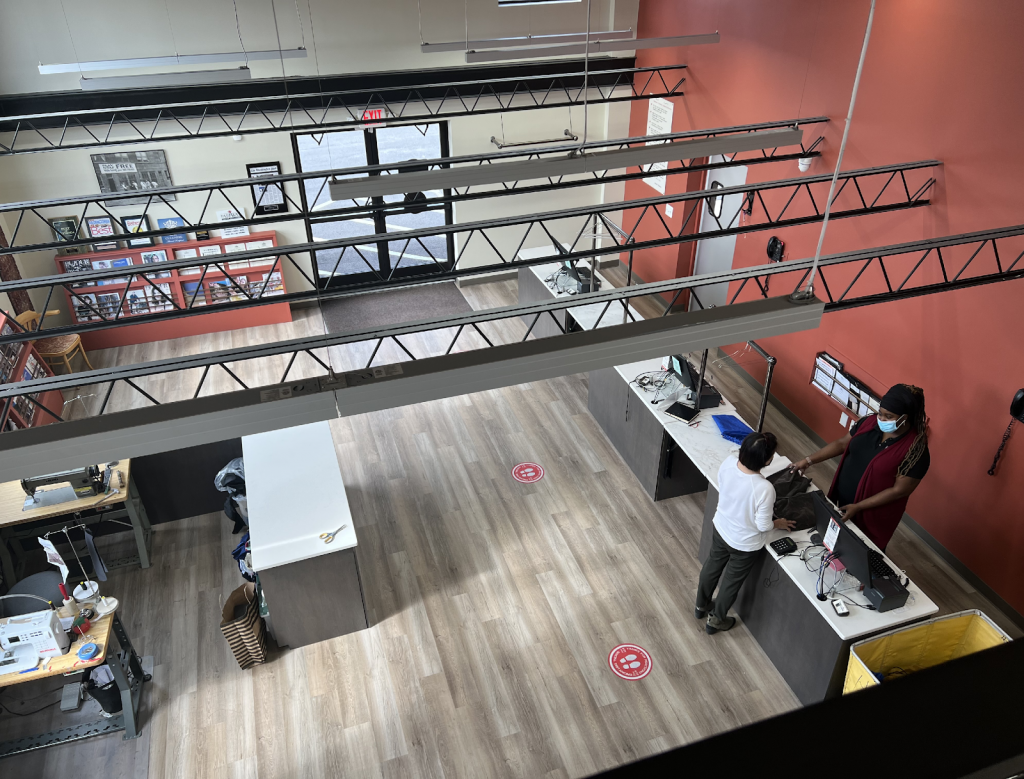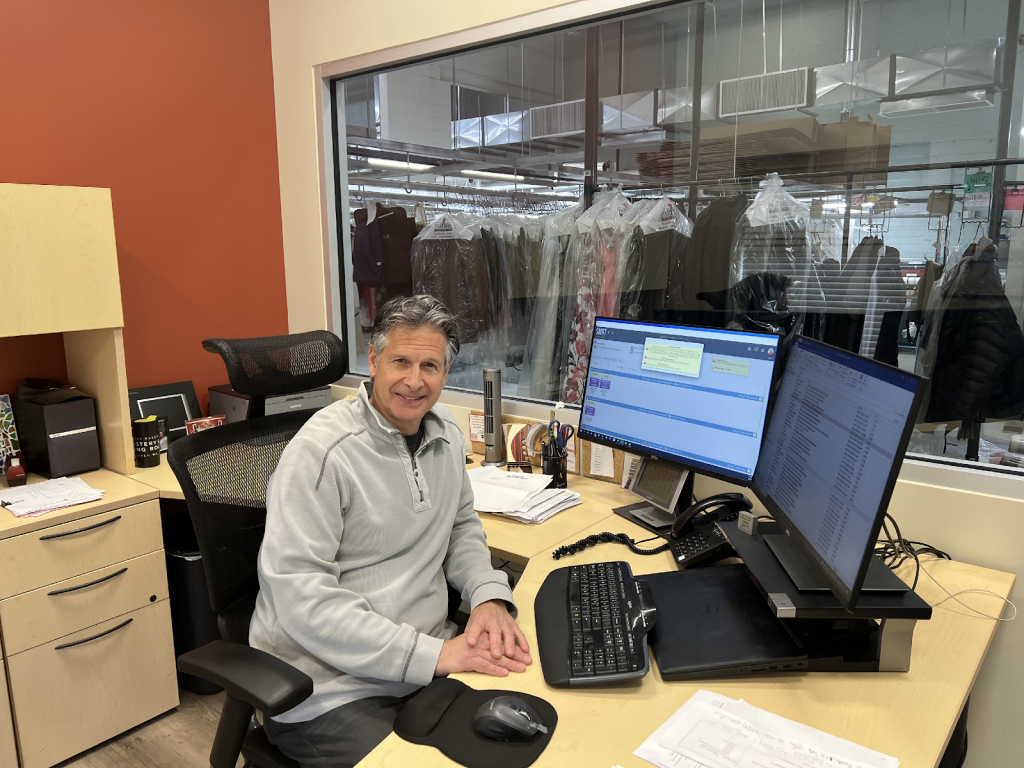It’s a small detail, but telling, because Simon–a Rochester native and former Eastman Community Music School student whose grandfather co-founded Germanow-Simon Corp, is that rare individual who excels in two disparate fields, in this case music– composing and jazz piano; and business–dry cleaning.

On the music side, Simon has toured widely performing music from his nine recordings. He’s appeared at the Kennedy Center for the Performing Arts, an Inaugural Gala for President Clinton, and at concert halls, jazz clubs, and community centers throughout North America. The Washington Post has called Simon’s music “harmonically sophisticated and hauntingly beautiful.”
On the business side, Parkway is not your neighborhood drop shop. Since he bought it in 2001, Simon has built Parkway into a $4 million a year business catering to an affluent and discriminating clientele. Shirts start at $4.95; sweaters at $25; blouses at $25.95; two-piece suits at $45 (pickup and delivery included). Parkway has also developed a specialty in handling historic and priceless items, among them drapes from the White House and foreign embassies, the baseball uniform of Yankee great Lou Gehrig, and the flag that adorns Lincoln’s box at Ford’s Theatre.
But first, some background.
The Simon family has deep roots in Rochester. In 1916, Jon Simon’s grandfather, Julius Simon, and business partner Harry Germanow, founded a small machine shop in Rochester. During World War I, when they learned U.S. troops at the front were breaking the glass crystals on their wristwatches, they invented and became a major supplier of plastic replacement watch crystals. Eventually, Germanow-Simon Corp. became the world’s largest manufacturer of plastic watch crystals and high-precision plastic lenses for industry.
Jon Simon, the eldest of four children of Leonard and Elaine Simon, grew up in Brighton and Pittsford, and attended Pittsford Sutherland High School. He played in a jazz band conducted by Chuck Mangione. Intending to pursue a music career, he enrolled at the University of Michigan School of Music.
He had planned, after his sophomore year, to transfer to the University of Southern California to study film scoring. But during that summer, his parents took him and his three sisters to Israel and while there he had what he describes as an epiphany. “If I pursued a music career,” he asked himself, “would I ever be able to take my family on a nice trip like this? Could I afford it? Would I even have the time?”
At that moment, recalls Simon, he realized: “I’ll always have music, but it doesn’t have to be my life.”
With the intent to join the family business, Simon cancelled plans for USC, stayed at Michigan, and switched his major to industrial engineering. After graduation, he earned a master’s degree from Harvard Business School and worked in Boston for a couple of years. Later, he did join the family business—working as plant manager of the plastics division—but after three years decided he wanted to pursue other ventures.

Married by then, Simon relocated to Washington, D.C., where his wife, Karen, worked for Voice of America. There, Simon worked in senior management positions with several firms, including internet startups, but eventually decided he wanted to be his own boss and started looking for a business to buy. A business broker pitched him Parkway.
“No second grader says, ‘I want to work in dry cleaning when I grow up,” Simon recently told the Harvard Business School alumni magazine.
But he saw in Parkway an intriguing opportunity. It was a family-owned business, operating since 1926, and with an excellent reputation. Having run the manufacturing side of his family’s business, he wasn’t intimidated by the complexity of a large operation with many employees and lots of moving parts, all requiring attention to detail. The opportunities to increase quality and efficiency through advanced computerization also appealed. He bought the business.
Ironically, those years of finding his footing in business overlapped with years in which Simon also made his biggest strides as a composer and performer.
“I’d sometimes play to audiences of up to 3,000 people, and then sell another thousand CDs afterwards,” he recalls. “I could make $4,000 dollars in an evening.”
At his peak, he was doing about two dozen shows a year across the country.
But with demands of the business and a growing family, Simon’s concerts gradually declined to about half a dozen a year before Covid, and just one or two since.

Parkway, on the other hand, was thriving. Simon increased full-time staff to 25, upgraded computer systems, bought five vehicles for pick-up and delivery, and in 2020 moved the plant to a renovated 10,000 square foot industrial space in North Bethesda.
Today, Parkway looks nothing like a typically cramped neighborhood cleaner. The airy, high-ceilinged front room has three counter positions where customers drop off clothes and discuss their garments with the staff. Nearby are three sewing machines where seamstresses do repairs and alterations. In a seated waiting area, racks of luxury lifestyle magazines and the catalogs of high-end clothing retailers reflect Parkway’s affluent clientele.
Toward the back of the plant were enormous cleaning machines, a climate-controlled storage vault filled to the ceiling with furs, wool suits and sweaters, and other off-season clothing; and pressors and spotters—some of them employed at Parkway for more than 25 years– working on individual garments. All around were specialty items waiting to be cleaned: Oriental carpets, heavy draperies, delicate shades, and upholstered dining room chairs. In one corner was a menagerie of taxidermic animals: a leopard, a water buffalo, an adult antelope and three babies, and the head of a zebra. These, Simon explained, were brought in by “an African big game hunter” who had a house fire and needed the skins cleaned and made odorless. Parkway has a special “ozone room” that removes smoke odor.

Later, we sit in Simon’s office, which looks out onto the production floor. Despite the haute couture all around, he was dressed simply in jeans and a sweater. At 66, he remains slender and trim with a full head of hair graying just a bit at the sides. The following is an edited version of our conversation.
ROCHESTER BEACON: I read you once personally cleaned the drapes in the Oval Office. True?
SIMON: About three summers ago, during the Trump administration, I did personally help on that job. It took about four hours just for the inspection of our vehicles and equipment at an off-site military base–escorted by Secret Service the whole time– before we could even enter the White House.
ROCHESTER BEACON: Do you still regularly play piano?
SIMON: I do. I’ve still got my Steinway at home. And we have a second house on the Eastern shore (of Maryland) where I’ve got a baby electric grand which I also love to play. But it’s not like I go home every night after work and play because often I’m kind of drained, but I still love to play and find time to do it, especially on weekends.
ROCHESTER BEACON: There’s a long tradition of musicians, writers, and poets balancing their artistic pursuits with conventional careers that offer more stable income and lifestyle. For example, (novelist) Herman Melville was deputy customs inspector at the Port of New York, (Russian composer) Borodin was a chemist—
SIMON: And (American composer) Charles Ives owned an insurance agency.
ROCHESTER BEACON: Exactly.
SIMON: Life is trade-offs. I love my life. I love my family. I love that I could build this business that I’ve built. It’s allowed me to put three kids through college and to have great experiences, including wonderful trips—like climbing the summit at Kilimanjaro. We’re going to go this summer to Sicily with the kids, on back roads, biking and hiking.
ROCHESTER BEACON: So, any regrets about not having pursued a concert career?
SIMON: Every now and then I think I could have done it and been successful. You always fantasize. Had I gone to USC, it was around the time Steven Spielberg was there. Would I have been his John Williams? No, I’m not John Williams, but with a lot of musical ideas and discipline, you never know.
ROCHESTER BEACON: You’ve probably given some thought to the future of Parkway. Are any of your kids interested in the business?
SIMON: We’ve talked about it and for the moment they’re not. We’ve got three kids, 34 to 29. They all live up in Brooklyn and they’re all in creative fields. My oldest son is a music agent. My daughter works as a project manager in a P.R. firm, and my youngest son is creative director for an advertising firm where he’ll direct commercials. At the moment, they’re happy.
ROCHESTER BEACON: If you were to someday sell the business, would you play concerts again?
SIMON: Possibly. The last concert I was scheduled to play was going to be at the Rochester JCC, but it got cancelled due to COVID. If I was retired? Probably I would put more time into the music and perform again. I’m not a golfer. I don’t play golf; I play music.

